Nursing Leadership in Clinical Practice: Review of Leadership Theories
VerifiedAdded on 2023/02/01
|8
|2393
|64
Essay
AI Summary
This essay provides a comprehensive overview of nursing leadership within the clinical practice setting. It begins by defining leadership in nursing, emphasizing the importance of organizing, directing, and inspiring others to achieve their full potential and enhance patient care. The essay explores various leadership theories, including the role of nurses in global health systems, the importance of clinical leadership, and the need for leadership development. It examines key research findings from studies by Daly et al. (2014), Halcomb et al. (2016), Miand & Voce (2018), and Wilson, Peterson, and Kornman (2013), highlighting the impact of leadership on patient outcomes, job satisfaction, and the overall healthcare environment. The essay also discusses the limitations of these studies and offers recommendations for future research and practice, such as the need for person-centered programs and infrastructure support. The conclusion reinforces the need for ongoing support and training to strengthen leadership skills among nurses, ultimately leading to improved patient outcomes and enhanced service delivery.
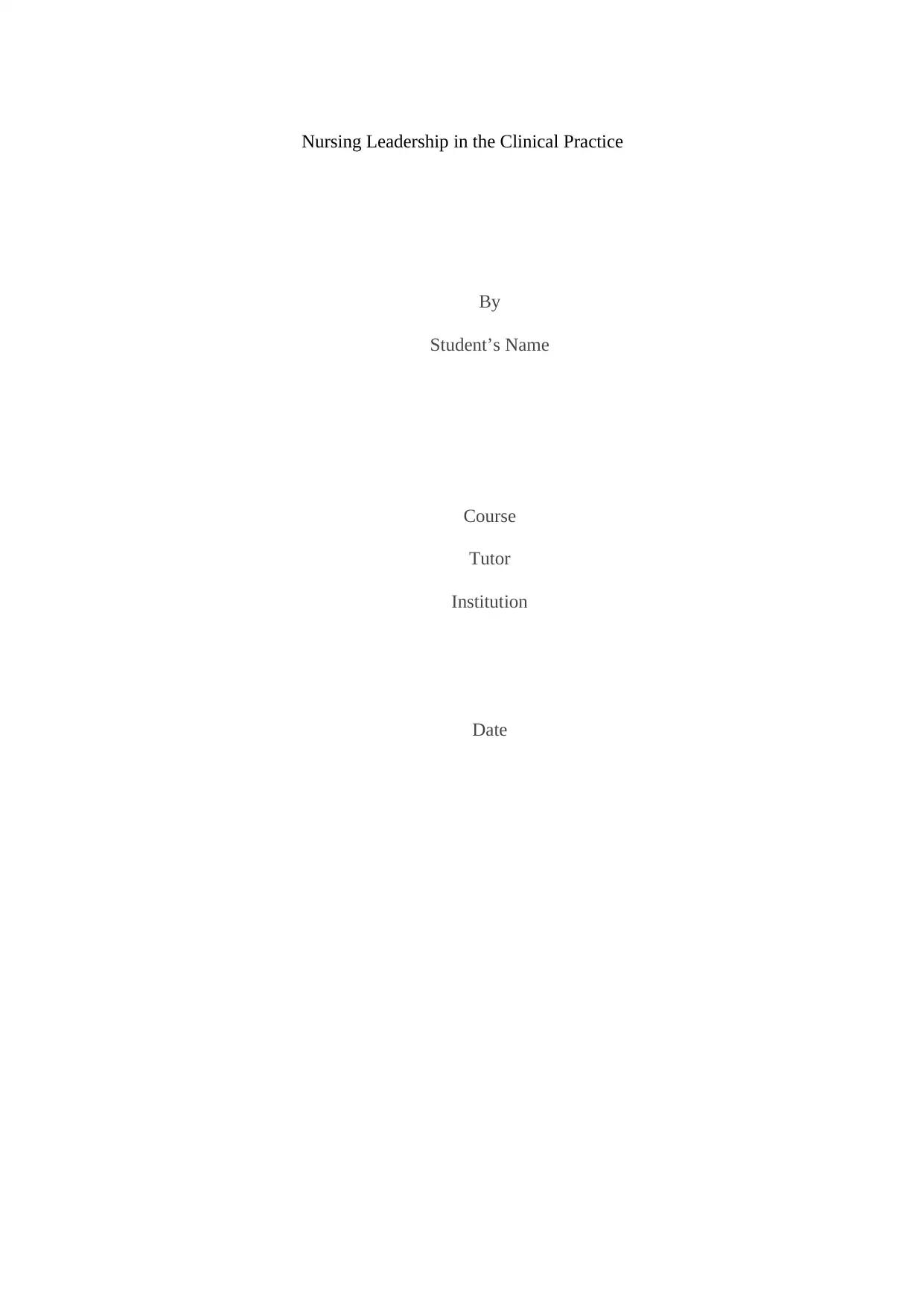
Nursing Leadership in the Clinical Practice
By
Student’s Name
Course
Tutor
Institution
Date
By
Student’s Name
Course
Tutor
Institution
Date
Paraphrase This Document
Need a fresh take? Get an instant paraphrase of this document with our AI Paraphraser
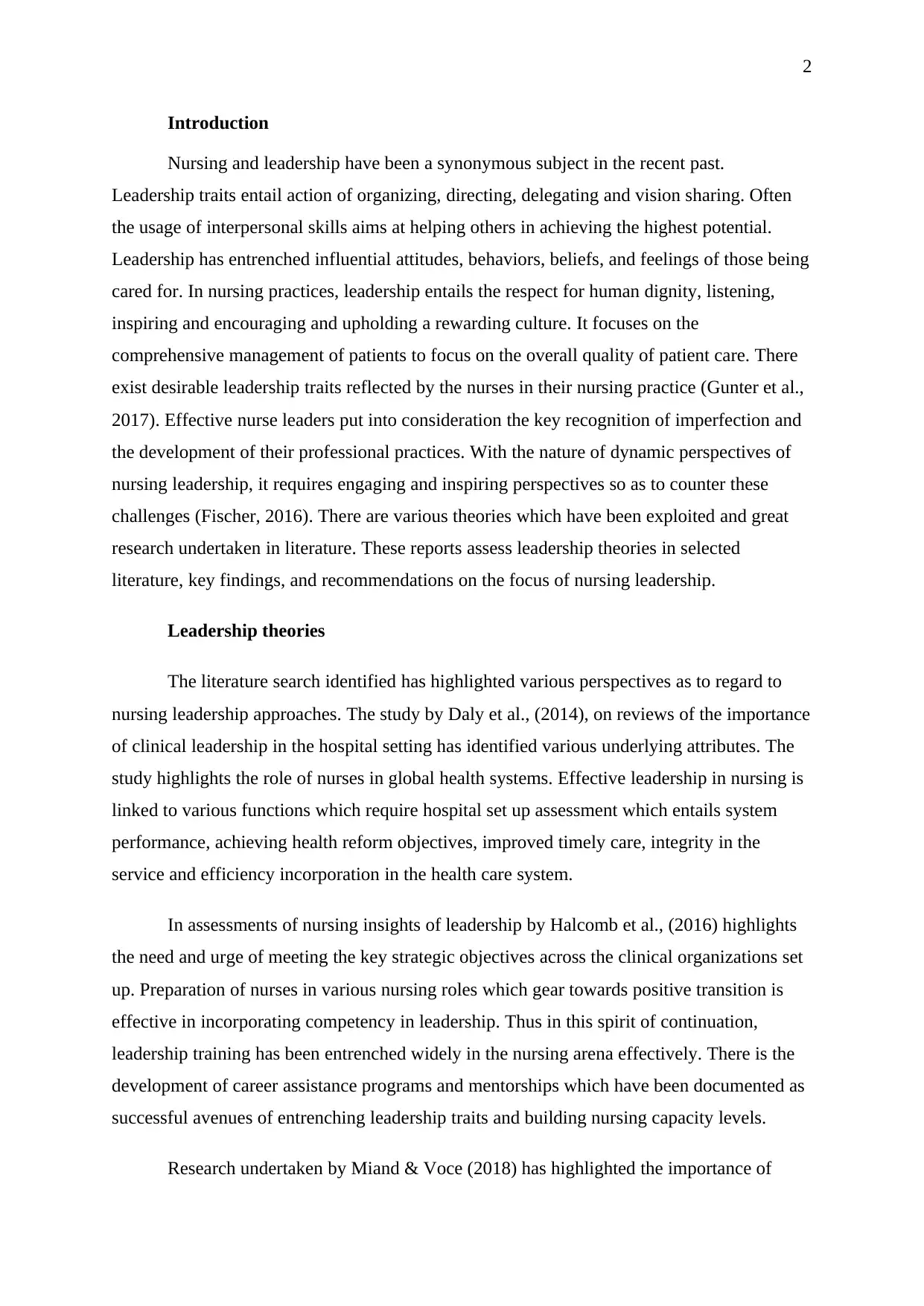
2
Introduction
Nursing and leadership have been a synonymous subject in the recent past.
Leadership traits entail action of organizing, directing, delegating and vision sharing. Often
the usage of interpersonal skills aims at helping others in achieving the highest potential.
Leadership has entrenched influential attitudes, behaviors, beliefs, and feelings of those being
cared for. In nursing practices, leadership entails the respect for human dignity, listening,
inspiring and encouraging and upholding a rewarding culture. It focuses on the
comprehensive management of patients to focus on the overall quality of patient care. There
exist desirable leadership traits reflected by the nurses in their nursing practice (Gunter et al.,
2017). Effective nurse leaders put into consideration the key recognition of imperfection and
the development of their professional practices. With the nature of dynamic perspectives of
nursing leadership, it requires engaging and inspiring perspectives so as to counter these
challenges (Fischer, 2016). There are various theories which have been exploited and great
research undertaken in literature. These reports assess leadership theories in selected
literature, key findings, and recommendations on the focus of nursing leadership.
Leadership theories
The literature search identified has highlighted various perspectives as to regard to
nursing leadership approaches. The study by Daly et al., (2014), on reviews of the importance
of clinical leadership in the hospital setting has identified various underlying attributes. The
study highlights the role of nurses in global health systems. Effective leadership in nursing is
linked to various functions which require hospital set up assessment which entails system
performance, achieving health reform objectives, improved timely care, integrity in the
service and efficiency incorporation in the health care system.
In assessments of nursing insights of leadership by Halcomb et al., (2016) highlights
the need and urge of meeting the key strategic objectives across the clinical organizations set
up. Preparation of nurses in various nursing roles which gear towards positive transition is
effective in incorporating competency in leadership. Thus in this spirit of continuation,
leadership training has been entrenched widely in the nursing arena effectively. There is the
development of career assistance programs and mentorships which have been documented as
successful avenues of entrenching leadership traits and building nursing capacity levels.
Research undertaken by Miand & Voce (2018) has highlighted the importance of
Introduction
Nursing and leadership have been a synonymous subject in the recent past.
Leadership traits entail action of organizing, directing, delegating and vision sharing. Often
the usage of interpersonal skills aims at helping others in achieving the highest potential.
Leadership has entrenched influential attitudes, behaviors, beliefs, and feelings of those being
cared for. In nursing practices, leadership entails the respect for human dignity, listening,
inspiring and encouraging and upholding a rewarding culture. It focuses on the
comprehensive management of patients to focus on the overall quality of patient care. There
exist desirable leadership traits reflected by the nurses in their nursing practice (Gunter et al.,
2017). Effective nurse leaders put into consideration the key recognition of imperfection and
the development of their professional practices. With the nature of dynamic perspectives of
nursing leadership, it requires engaging and inspiring perspectives so as to counter these
challenges (Fischer, 2016). There are various theories which have been exploited and great
research undertaken in literature. These reports assess leadership theories in selected
literature, key findings, and recommendations on the focus of nursing leadership.
Leadership theories
The literature search identified has highlighted various perspectives as to regard to
nursing leadership approaches. The study by Daly et al., (2014), on reviews of the importance
of clinical leadership in the hospital setting has identified various underlying attributes. The
study highlights the role of nurses in global health systems. Effective leadership in nursing is
linked to various functions which require hospital set up assessment which entails system
performance, achieving health reform objectives, improved timely care, integrity in the
service and efficiency incorporation in the health care system.
In assessments of nursing insights of leadership by Halcomb et al., (2016) highlights
the need and urge of meeting the key strategic objectives across the clinical organizations set
up. Preparation of nurses in various nursing roles which gear towards positive transition is
effective in incorporating competency in leadership. Thus in this spirit of continuation,
leadership training has been entrenched widely in the nursing arena effectively. There is the
development of career assistance programs and mentorships which have been documented as
successful avenues of entrenching leadership traits and building nursing capacity levels.
Research undertaken by Miand & Voce (2018) has highlighted the importance of
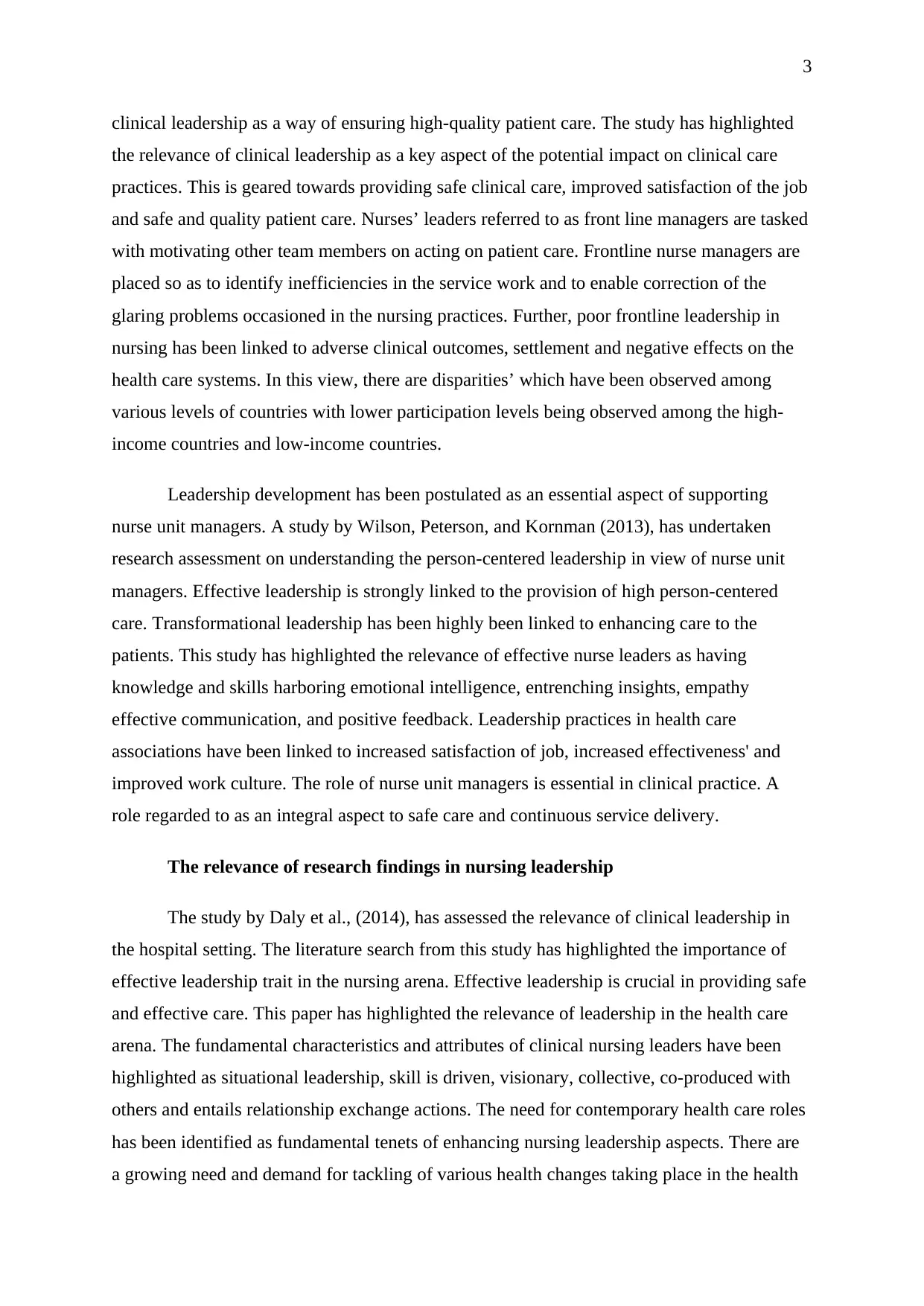
3
clinical leadership as a way of ensuring high-quality patient care. The study has highlighted
the relevance of clinical leadership as a key aspect of the potential impact on clinical care
practices. This is geared towards providing safe clinical care, improved satisfaction of the job
and safe and quality patient care. Nurses’ leaders referred to as front line managers are tasked
with motivating other team members on acting on patient care. Frontline nurse managers are
placed so as to identify inefficiencies in the service work and to enable correction of the
glaring problems occasioned in the nursing practices. Further, poor frontline leadership in
nursing has been linked to adverse clinical outcomes, settlement and negative effects on the
health care systems. In this view, there are disparities’ which have been observed among
various levels of countries with lower participation levels being observed among the high-
income countries and low-income countries.
Leadership development has been postulated as an essential aspect of supporting
nurse unit managers. A study by Wilson, Peterson, and Kornman (2013), has undertaken
research assessment on understanding the person-centered leadership in view of nurse unit
managers. Effective leadership is strongly linked to the provision of high person-centered
care. Transformational leadership has been highly been linked to enhancing care to the
patients. This study has highlighted the relevance of effective nurse leaders as having
knowledge and skills harboring emotional intelligence, entrenching insights, empathy
effective communication, and positive feedback. Leadership practices in health care
associations have been linked to increased satisfaction of job, increased effectiveness' and
improved work culture. The role of nurse unit managers is essential in clinical practice. A
role regarded to as an integral aspect to safe care and continuous service delivery.
The relevance of research findings in nursing leadership
The study by Daly et al., (2014), has assessed the relevance of clinical leadership in
the hospital setting. The literature search from this study has highlighted the importance of
effective leadership trait in the nursing arena. Effective leadership is crucial in providing safe
and effective care. This paper has highlighted the relevance of leadership in the health care
arena. The fundamental characteristics and attributes of clinical nursing leaders have been
highlighted as situational leadership, skill is driven, visionary, collective, co-produced with
others and entails relationship exchange actions. The need for contemporary health care roles
has been identified as fundamental tenets of enhancing nursing leadership aspects. There are
a growing need and demand for tackling of various health changes taking place in the health
clinical leadership as a way of ensuring high-quality patient care. The study has highlighted
the relevance of clinical leadership as a key aspect of the potential impact on clinical care
practices. This is geared towards providing safe clinical care, improved satisfaction of the job
and safe and quality patient care. Nurses’ leaders referred to as front line managers are tasked
with motivating other team members on acting on patient care. Frontline nurse managers are
placed so as to identify inefficiencies in the service work and to enable correction of the
glaring problems occasioned in the nursing practices. Further, poor frontline leadership in
nursing has been linked to adverse clinical outcomes, settlement and negative effects on the
health care systems. In this view, there are disparities’ which have been observed among
various levels of countries with lower participation levels being observed among the high-
income countries and low-income countries.
Leadership development has been postulated as an essential aspect of supporting
nurse unit managers. A study by Wilson, Peterson, and Kornman (2013), has undertaken
research assessment on understanding the person-centered leadership in view of nurse unit
managers. Effective leadership is strongly linked to the provision of high person-centered
care. Transformational leadership has been highly been linked to enhancing care to the
patients. This study has highlighted the relevance of effective nurse leaders as having
knowledge and skills harboring emotional intelligence, entrenching insights, empathy
effective communication, and positive feedback. Leadership practices in health care
associations have been linked to increased satisfaction of job, increased effectiveness' and
improved work culture. The role of nurse unit managers is essential in clinical practice. A
role regarded to as an integral aspect to safe care and continuous service delivery.
The relevance of research findings in nursing leadership
The study by Daly et al., (2014), has assessed the relevance of clinical leadership in
the hospital setting. The literature search from this study has highlighted the importance of
effective leadership trait in the nursing arena. Effective leadership is crucial in providing safe
and effective care. This paper has highlighted the relevance of leadership in the health care
arena. The fundamental characteristics and attributes of clinical nursing leaders have been
highlighted as situational leadership, skill is driven, visionary, collective, co-produced with
others and entails relationship exchange actions. The need for contemporary health care roles
has been identified as fundamental tenets of enhancing nursing leadership aspects. There are
a growing need and demand for tackling of various health changes taking place in the health
⊘ This is a preview!⊘
Do you want full access?
Subscribe today to unlock all pages.

Trusted by 1+ million students worldwide
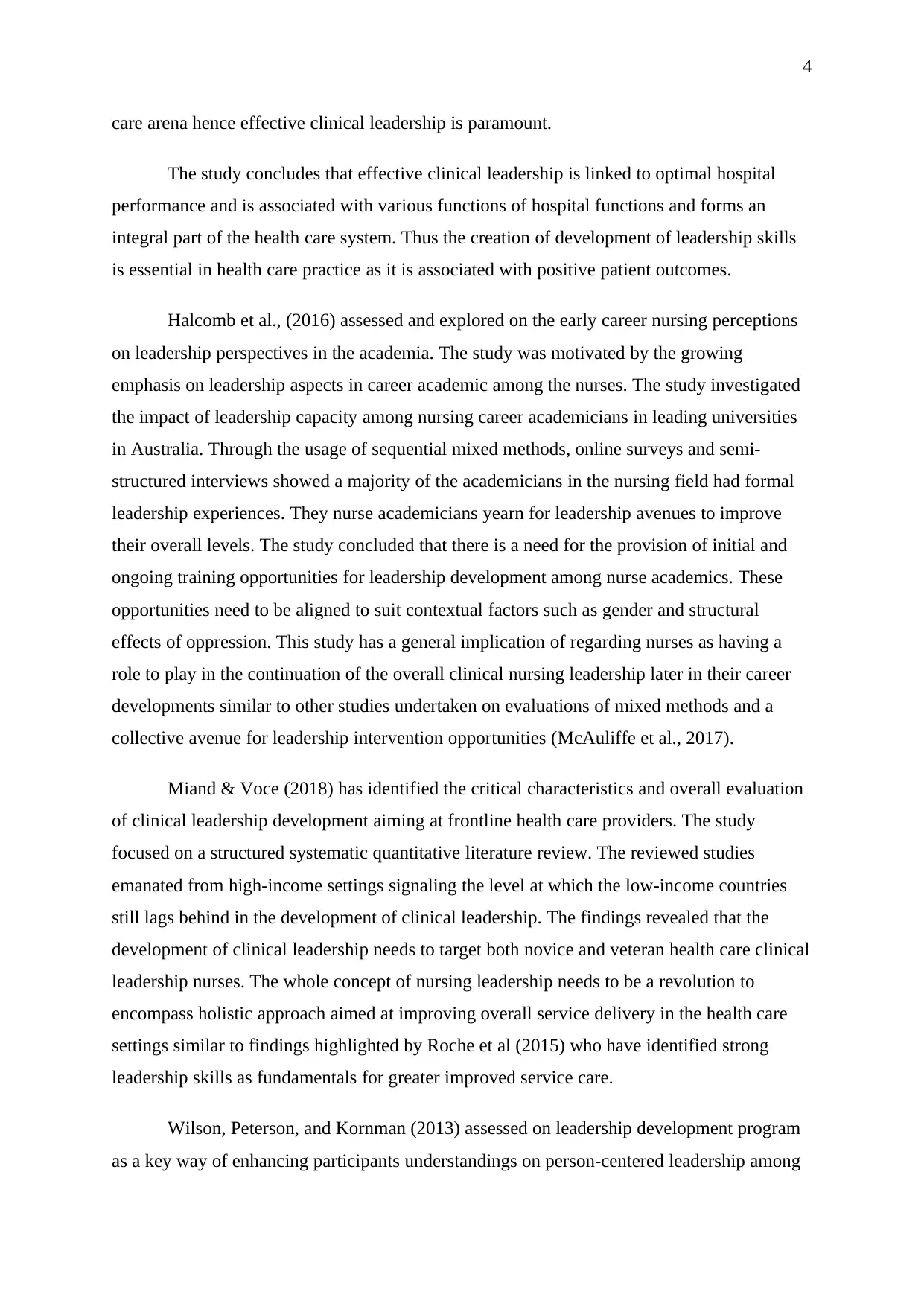
4
care arena hence effective clinical leadership is paramount.
The study concludes that effective clinical leadership is linked to optimal hospital
performance and is associated with various functions of hospital functions and forms an
integral part of the health care system. Thus the creation of development of leadership skills
is essential in health care practice as it is associated with positive patient outcomes.
Halcomb et al., (2016) assessed and explored on the early career nursing perceptions
on leadership perspectives in the academia. The study was motivated by the growing
emphasis on leadership aspects in career academic among the nurses. The study investigated
the impact of leadership capacity among nursing career academicians in leading universities
in Australia. Through the usage of sequential mixed methods, online surveys and semi-
structured interviews showed a majority of the academicians in the nursing field had formal
leadership experiences. They nurse academicians yearn for leadership avenues to improve
their overall levels. The study concluded that there is a need for the provision of initial and
ongoing training opportunities for leadership development among nurse academics. These
opportunities need to be aligned to suit contextual factors such as gender and structural
effects of oppression. This study has a general implication of regarding nurses as having a
role to play in the continuation of the overall clinical nursing leadership later in their career
developments similar to other studies undertaken on evaluations of mixed methods and a
collective avenue for leadership intervention opportunities (McAuliffe et al., 2017).
Miand & Voce (2018) has identified the critical characteristics and overall evaluation
of clinical leadership development aiming at frontline health care providers. The study
focused on a structured systematic quantitative literature review. The reviewed studies
emanated from high-income settings signaling the level at which the low-income countries
still lags behind in the development of clinical leadership. The findings revealed that the
development of clinical leadership needs to target both novice and veteran health care clinical
leadership nurses. The whole concept of nursing leadership needs to be a revolution to
encompass holistic approach aimed at improving overall service delivery in the health care
settings similar to findings highlighted by Roche et al (2015) who have identified strong
leadership skills as fundamentals for greater improved service care.
Wilson, Peterson, and Kornman (2013) assessed on leadership development program
as a key way of enhancing participants understandings on person-centered leadership among
care arena hence effective clinical leadership is paramount.
The study concludes that effective clinical leadership is linked to optimal hospital
performance and is associated with various functions of hospital functions and forms an
integral part of the health care system. Thus the creation of development of leadership skills
is essential in health care practice as it is associated with positive patient outcomes.
Halcomb et al., (2016) assessed and explored on the early career nursing perceptions
on leadership perspectives in the academia. The study was motivated by the growing
emphasis on leadership aspects in career academic among the nurses. The study investigated
the impact of leadership capacity among nursing career academicians in leading universities
in Australia. Through the usage of sequential mixed methods, online surveys and semi-
structured interviews showed a majority of the academicians in the nursing field had formal
leadership experiences. They nurse academicians yearn for leadership avenues to improve
their overall levels. The study concluded that there is a need for the provision of initial and
ongoing training opportunities for leadership development among nurse academics. These
opportunities need to be aligned to suit contextual factors such as gender and structural
effects of oppression. This study has a general implication of regarding nurses as having a
role to play in the continuation of the overall clinical nursing leadership later in their career
developments similar to other studies undertaken on evaluations of mixed methods and a
collective avenue for leadership intervention opportunities (McAuliffe et al., 2017).
Miand & Voce (2018) has identified the critical characteristics and overall evaluation
of clinical leadership development aiming at frontline health care providers. The study
focused on a structured systematic quantitative literature review. The reviewed studies
emanated from high-income settings signaling the level at which the low-income countries
still lags behind in the development of clinical leadership. The findings revealed that the
development of clinical leadership needs to target both novice and veteran health care clinical
leadership nurses. The whole concept of nursing leadership needs to be a revolution to
encompass holistic approach aimed at improving overall service delivery in the health care
settings similar to findings highlighted by Roche et al (2015) who have identified strong
leadership skills as fundamentals for greater improved service care.
Wilson, Peterson, and Kornman (2013) assessed on leadership development program
as a key way of enhancing participants understandings on person-centered leadership among
Paraphrase This Document
Need a fresh take? Get an instant paraphrase of this document with our AI Paraphraser
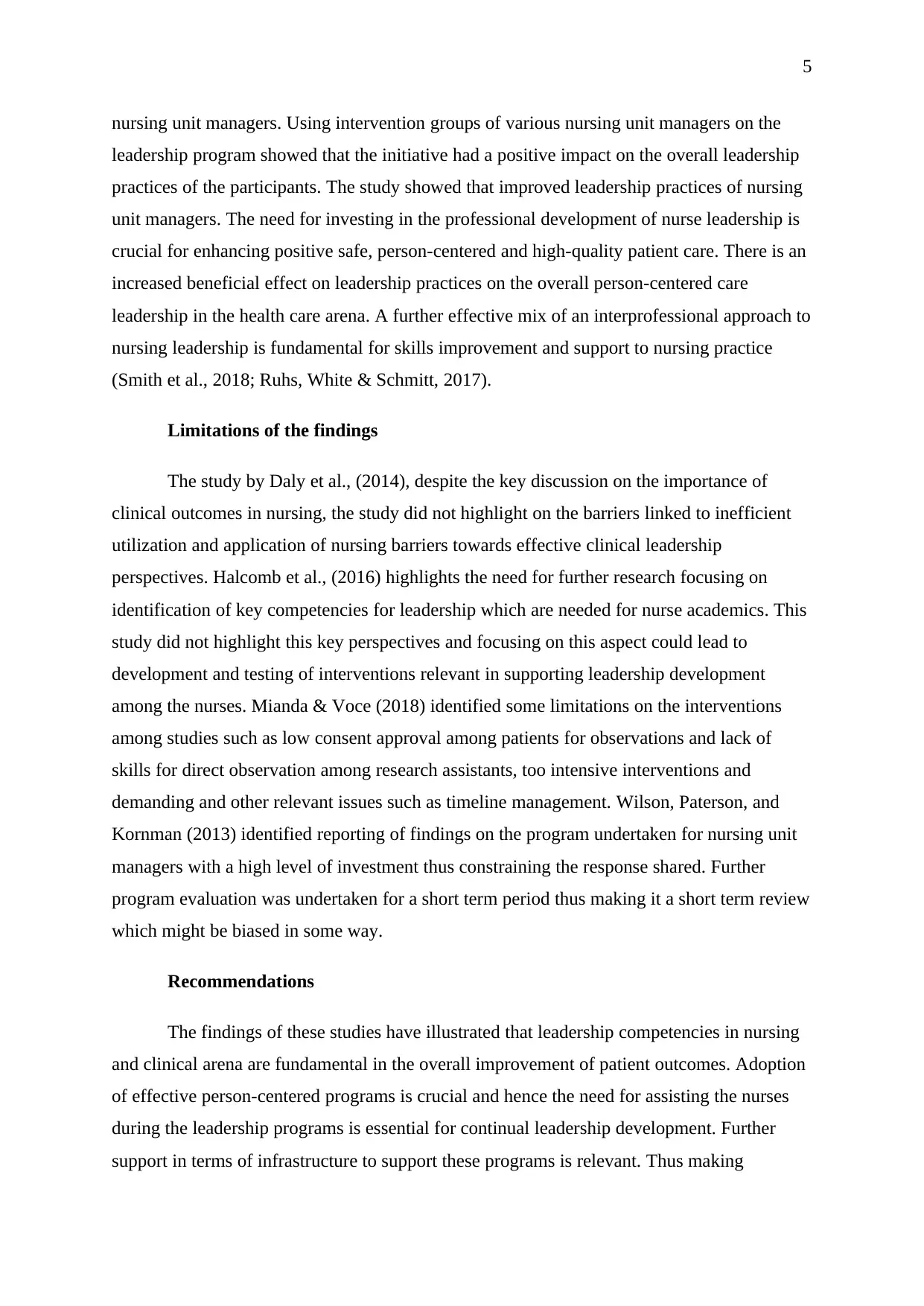
5
nursing unit managers. Using intervention groups of various nursing unit managers on the
leadership program showed that the initiative had a positive impact on the overall leadership
practices of the participants. The study showed that improved leadership practices of nursing
unit managers. The need for investing in the professional development of nurse leadership is
crucial for enhancing positive safe, person-centered and high-quality patient care. There is an
increased beneficial effect on leadership practices on the overall person-centered care
leadership in the health care arena. A further effective mix of an interprofessional approach to
nursing leadership is fundamental for skills improvement and support to nursing practice
(Smith et al., 2018; Ruhs, White & Schmitt, 2017).
Limitations of the findings
The study by Daly et al., (2014), despite the key discussion on the importance of
clinical outcomes in nursing, the study did not highlight on the barriers linked to inefficient
utilization and application of nursing barriers towards effective clinical leadership
perspectives. Halcomb et al., (2016) highlights the need for further research focusing on
identification of key competencies for leadership which are needed for nurse academics. This
study did not highlight this key perspectives and focusing on this aspect could lead to
development and testing of interventions relevant in supporting leadership development
among the nurses. Mianda & Voce (2018) identified some limitations on the interventions
among studies such as low consent approval among patients for observations and lack of
skills for direct observation among research assistants, too intensive interventions and
demanding and other relevant issues such as timeline management. Wilson, Paterson, and
Kornman (2013) identified reporting of findings on the program undertaken for nursing unit
managers with a high level of investment thus constraining the response shared. Further
program evaluation was undertaken for a short term period thus making it a short term review
which might be biased in some way.
Recommendations
The findings of these studies have illustrated that leadership competencies in nursing
and clinical arena are fundamental in the overall improvement of patient outcomes. Adoption
of effective person-centered programs is crucial and hence the need for assisting the nurses
during the leadership programs is essential for continual leadership development. Further
support in terms of infrastructure to support these programs is relevant. Thus making
nursing unit managers. Using intervention groups of various nursing unit managers on the
leadership program showed that the initiative had a positive impact on the overall leadership
practices of the participants. The study showed that improved leadership practices of nursing
unit managers. The need for investing in the professional development of nurse leadership is
crucial for enhancing positive safe, person-centered and high-quality patient care. There is an
increased beneficial effect on leadership practices on the overall person-centered care
leadership in the health care arena. A further effective mix of an interprofessional approach to
nursing leadership is fundamental for skills improvement and support to nursing practice
(Smith et al., 2018; Ruhs, White & Schmitt, 2017).
Limitations of the findings
The study by Daly et al., (2014), despite the key discussion on the importance of
clinical outcomes in nursing, the study did not highlight on the barriers linked to inefficient
utilization and application of nursing barriers towards effective clinical leadership
perspectives. Halcomb et al., (2016) highlights the need for further research focusing on
identification of key competencies for leadership which are needed for nurse academics. This
study did not highlight this key perspectives and focusing on this aspect could lead to
development and testing of interventions relevant in supporting leadership development
among the nurses. Mianda & Voce (2018) identified some limitations on the interventions
among studies such as low consent approval among patients for observations and lack of
skills for direct observation among research assistants, too intensive interventions and
demanding and other relevant issues such as timeline management. Wilson, Paterson, and
Kornman (2013) identified reporting of findings on the program undertaken for nursing unit
managers with a high level of investment thus constraining the response shared. Further
program evaluation was undertaken for a short term period thus making it a short term review
which might be biased in some way.
Recommendations
The findings of these studies have illustrated that leadership competencies in nursing
and clinical arena are fundamental in the overall improvement of patient outcomes. Adoption
of effective person-centered programs is crucial and hence the need for assisting the nurses
during the leadership programs is essential for continual leadership development. Further
support in terms of infrastructure to support these programs is relevant. Thus making
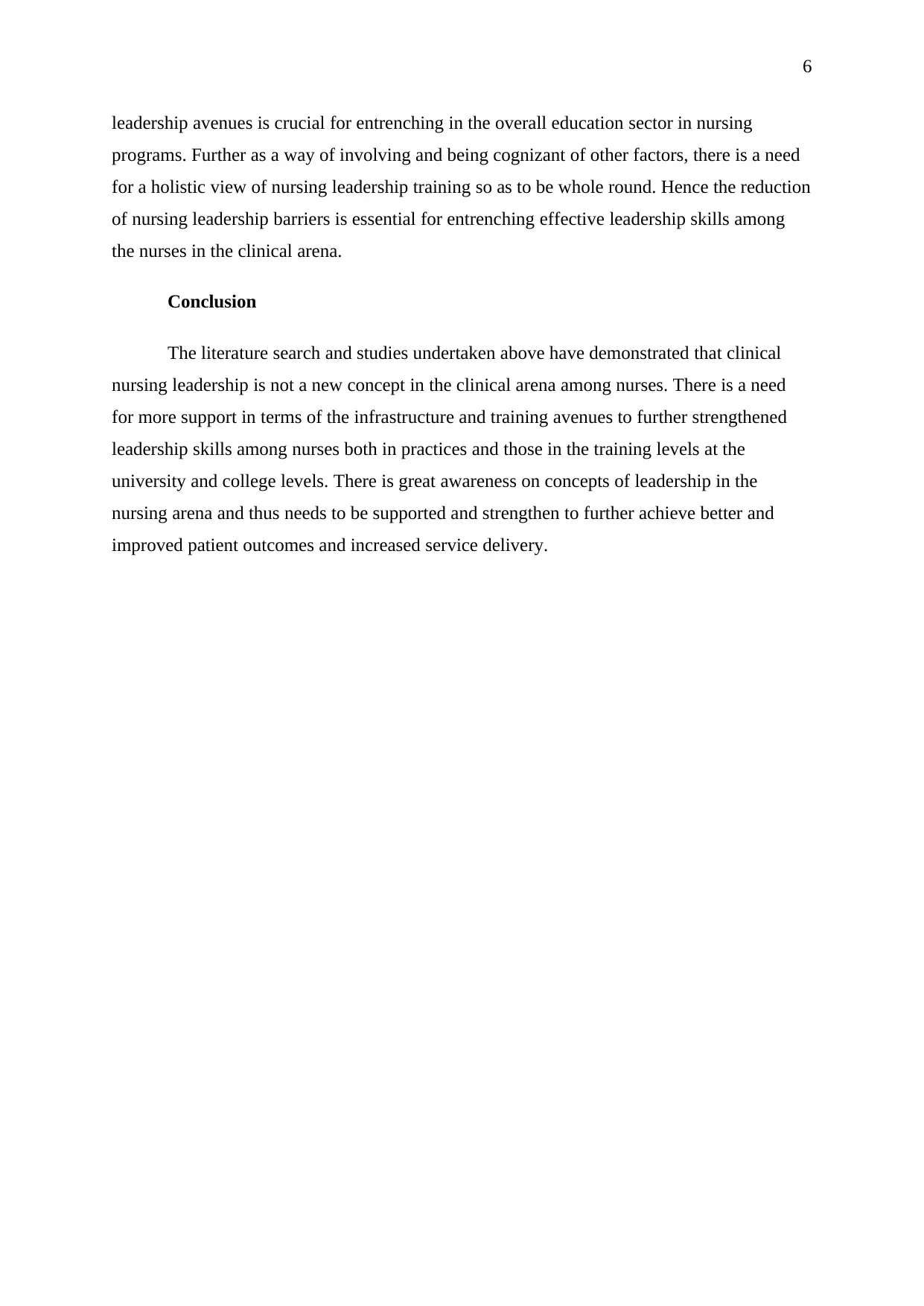
6
leadership avenues is crucial for entrenching in the overall education sector in nursing
programs. Further as a way of involving and being cognizant of other factors, there is a need
for a holistic view of nursing leadership training so as to be whole round. Hence the reduction
of nursing leadership barriers is essential for entrenching effective leadership skills among
the nurses in the clinical arena.
Conclusion
The literature search and studies undertaken above have demonstrated that clinical
nursing leadership is not a new concept in the clinical arena among nurses. There is a need
for more support in terms of the infrastructure and training avenues to further strengthened
leadership skills among nurses both in practices and those in the training levels at the
university and college levels. There is great awareness on concepts of leadership in the
nursing arena and thus needs to be supported and strengthen to further achieve better and
improved patient outcomes and increased service delivery.
leadership avenues is crucial for entrenching in the overall education sector in nursing
programs. Further as a way of involving and being cognizant of other factors, there is a need
for a holistic view of nursing leadership training so as to be whole round. Hence the reduction
of nursing leadership barriers is essential for entrenching effective leadership skills among
the nurses in the clinical arena.
Conclusion
The literature search and studies undertaken above have demonstrated that clinical
nursing leadership is not a new concept in the clinical arena among nurses. There is a need
for more support in terms of the infrastructure and training avenues to further strengthened
leadership skills among nurses both in practices and those in the training levels at the
university and college levels. There is great awareness on concepts of leadership in the
nursing arena and thus needs to be supported and strengthen to further achieve better and
improved patient outcomes and increased service delivery.
⊘ This is a preview!⊘
Do you want full access?
Subscribe today to unlock all pages.

Trusted by 1+ million students worldwide
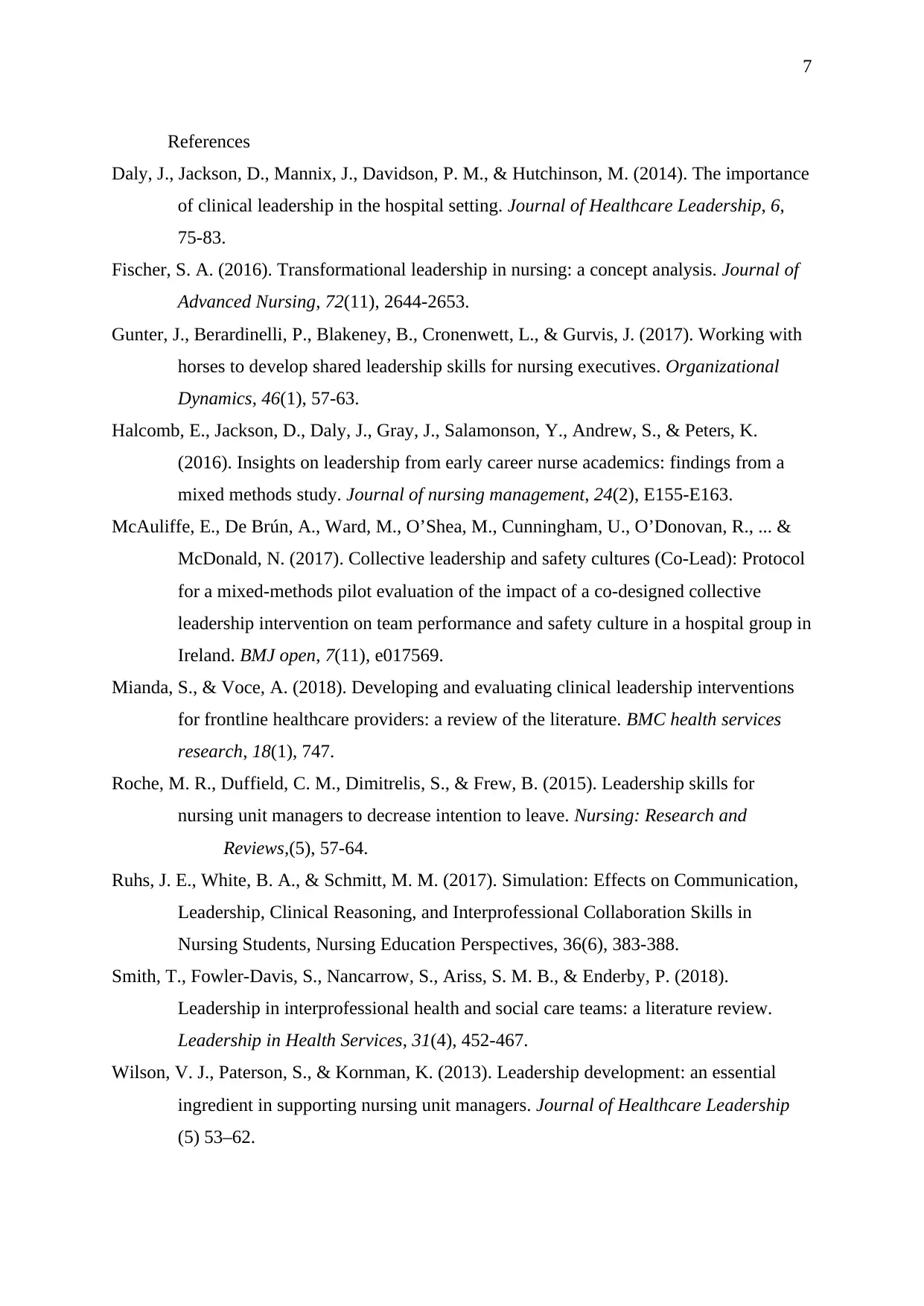
7
References
Daly, J., Jackson, D., Mannix, J., Davidson, P. M., & Hutchinson, M. (2014). The importance
of clinical leadership in the hospital setting. Journal of Healthcare Leadership, 6,
75-83.
Fischer, S. A. (2016). Transformational leadership in nursing: a concept analysis. Journal of
Advanced Nursing, 72(11), 2644-2653.
Gunter, J., Berardinelli, P., Blakeney, B., Cronenwett, L., & Gurvis, J. (2017). Working with
horses to develop shared leadership skills for nursing executives. Organizational
Dynamics, 46(1), 57-63.
Halcomb, E., Jackson, D., Daly, J., Gray, J., Salamonson, Y., Andrew, S., & Peters, K.
(2016). Insights on leadership from early career nurse academics: findings from a
mixed methods study. Journal of nursing management, 24(2), E155-E163.
McAuliffe, E., De Brún, A., Ward, M., O’Shea, M., Cunningham, U., O’Donovan, R., ... &
McDonald, N. (2017). Collective leadership and safety cultures (Co-Lead): Protocol
for a mixed-methods pilot evaluation of the impact of a co-designed collective
leadership intervention on team performance and safety culture in a hospital group in
Ireland. BMJ open, 7(11), e017569.
Mianda, S., & Voce, A. (2018). Developing and evaluating clinical leadership interventions
for frontline healthcare providers: a review of the literature. BMC health services
research, 18(1), 747.
Roche, M. R., Duffield, C. M., Dimitrelis, S., & Frew, B. (2015). Leadership skills for
nursing unit managers to decrease intention to leave. Nursing: Research and
Reviews,(5), 57-64.
Ruhs, J. E., White, B. A., & Schmitt, M. M. (2017). Simulation: Effects on Communication,
Leadership, Clinical Reasoning, and Interprofessional Collaboration Skills in
Nursing Students, Nursing Education Perspectives, 36(6), 383-388.
Smith, T., Fowler-Davis, S., Nancarrow, S., Ariss, S. M. B., & Enderby, P. (2018).
Leadership in interprofessional health and social care teams: a literature review.
Leadership in Health Services, 31(4), 452-467.
Wilson, V. J., Paterson, S., & Kornman, K. (2013). Leadership development: an essential
ingredient in supporting nursing unit managers. Journal of Healthcare Leadership
(5) 53–62.
References
Daly, J., Jackson, D., Mannix, J., Davidson, P. M., & Hutchinson, M. (2014). The importance
of clinical leadership in the hospital setting. Journal of Healthcare Leadership, 6,
75-83.
Fischer, S. A. (2016). Transformational leadership in nursing: a concept analysis. Journal of
Advanced Nursing, 72(11), 2644-2653.
Gunter, J., Berardinelli, P., Blakeney, B., Cronenwett, L., & Gurvis, J. (2017). Working with
horses to develop shared leadership skills for nursing executives. Organizational
Dynamics, 46(1), 57-63.
Halcomb, E., Jackson, D., Daly, J., Gray, J., Salamonson, Y., Andrew, S., & Peters, K.
(2016). Insights on leadership from early career nurse academics: findings from a
mixed methods study. Journal of nursing management, 24(2), E155-E163.
McAuliffe, E., De Brún, A., Ward, M., O’Shea, M., Cunningham, U., O’Donovan, R., ... &
McDonald, N. (2017). Collective leadership and safety cultures (Co-Lead): Protocol
for a mixed-methods pilot evaluation of the impact of a co-designed collective
leadership intervention on team performance and safety culture in a hospital group in
Ireland. BMJ open, 7(11), e017569.
Mianda, S., & Voce, A. (2018). Developing and evaluating clinical leadership interventions
for frontline healthcare providers: a review of the literature. BMC health services
research, 18(1), 747.
Roche, M. R., Duffield, C. M., Dimitrelis, S., & Frew, B. (2015). Leadership skills for
nursing unit managers to decrease intention to leave. Nursing: Research and
Reviews,(5), 57-64.
Ruhs, J. E., White, B. A., & Schmitt, M. M. (2017). Simulation: Effects on Communication,
Leadership, Clinical Reasoning, and Interprofessional Collaboration Skills in
Nursing Students, Nursing Education Perspectives, 36(6), 383-388.
Smith, T., Fowler-Davis, S., Nancarrow, S., Ariss, S. M. B., & Enderby, P. (2018).
Leadership in interprofessional health and social care teams: a literature review.
Leadership in Health Services, 31(4), 452-467.
Wilson, V. J., Paterson, S., & Kornman, K. (2013). Leadership development: an essential
ingredient in supporting nursing unit managers. Journal of Healthcare Leadership
(5) 53–62.
Paraphrase This Document
Need a fresh take? Get an instant paraphrase of this document with our AI Paraphraser

8
1 out of 8
Related Documents
Your All-in-One AI-Powered Toolkit for Academic Success.
+13062052269
info@desklib.com
Available 24*7 on WhatsApp / Email
![[object Object]](/_next/static/media/star-bottom.7253800d.svg)
Unlock your academic potential
Copyright © 2020–2026 A2Z Services. All Rights Reserved. Developed and managed by ZUCOL.





